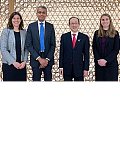Messages from Keidanren Executives and Contributed articles to Keidanren Journals April, 2024 Exchange of Views on Antitrust Law with the U.S. Department of Justice -Sub-Committee on Competition Policy of Committee on Economic Law

On February 29th, Keidanren (Japan Business Federation) held a meeting of the Sub-Committee on Competition Policy of Committee on Economic Law (chairman: Kenji Ohno) at Keidanren Kaikan in Otemachi, Tokyo. Representatives from the U.S. Department of Justice Antitrust Division were Mr. Manish Kumar, Deputy Assistant Attorney General for Criminal Enforcement, Ms. Leslie Wulff, San Francisco Office Section Chief, and Ms. Sarah Bartels, Trial Attorney in Technology & Digital Platforms Section and International Counsel. They explained the current situation and challenges regarding the enforcement of antitrust laws in the United States and exchanged views with attending Japanese companies. The overview of the explanations is as follows:
Explanation by the U.S. Department of Justice:
The U.S. Department of Justice has been conducting prosecution and investigation of antitrust laws, which have involved Japanese companies for many years. Given that economic crime doesn't confine itself within borders, recent cases related to automotive parts highlight that not only consumers who purchased high-priced products but also Japanese companies are victims.
The Department of Justice prosecutes cases involving price-fixing cartels among competing companies, market/customer division, bid rigging, and monopolization. Price-fixing cartels involve agreements among competing companies regarding prices, which can be considered illegal even if there is no explicit agreement on specific prices. For instance, actions such as agreeing not to offer discounts or setting minimum prices are also considered unlawful.
Similar to Japan Fair Trade Commission, the United States has also introduced leniency programs. Under these programs, companies or individuals who report misconduct to the government are granted immunity from prosecution. Leniency is a privilege given to the first entity or individual to report, emphasizing the importance of prompt self-reporting. Currently, leniency can be obtained not only for violations of antitrust laws but also for violations of other laws, as outlined in the FAQ section on the Department of Justice's website.
It is crucial for companies to establish compliance programs to prevent antitrust violations and benefit from leniency programs. With recent policy changes, if a company can demonstrate that it had a compliance program for antitrust at the time a violation occurred, it may have the opportunity to avoid prosecution.
Additionally, the Department of Justice clarified its guidance regarding voluntary disclosures in the M&A space last autumn and again this spring. If illegal activities by the target company are discovered during due diligence, and the acquiring company, who was not involved, voluntarily and promptly reports them to the authorities, it can receive assurance of non-prosecution even after the deal is completed. Furthermore, this policy extends beyond antitrust violations to cover other illegal activities discovered by the uninvolved acquiring company.
Lastly, the Department of Justice is strengthening its collaboration with the FBI to address collaborative activities within corporate supply chain. As the COVID19 pandemic caused disruptions in business operations, now that the markets are stabilizing, we are closely monitoring antitrust violations.
After the explanations, there was an exchange of views regarding the details of the new compliance program and how the Department evaluates evidence.

